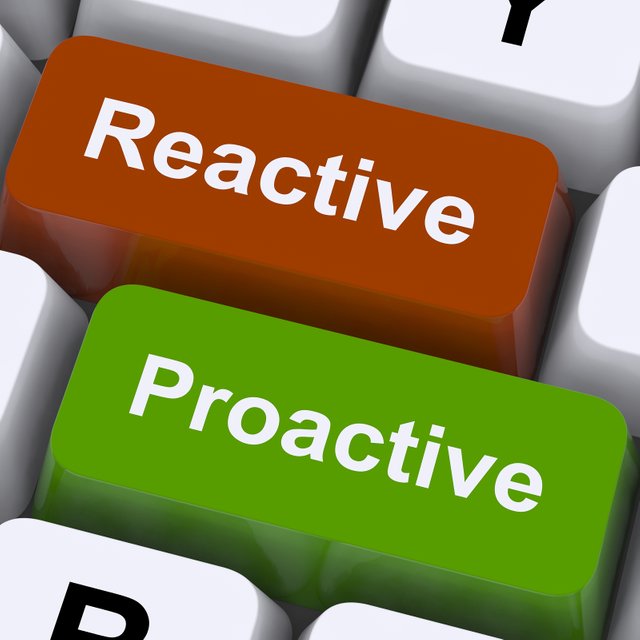Becoming proactive person (Simple ways to improve yourself)
Being proactive means taking responsibility for your life and actions rather than just watching how things happen.

Do you react to the events happening around you or do you take initiative to prepare for, participate in and/or control the events?
Do you take an active or passive role? Do you think in terms of the present or do you look to the future, anticipating outcomes and preparing for the consequences?
Do you make a decision only when you have to, when you’re backed into a corner or when you’ve put it off for as long as you can? Or do you make conscious decisions as part of a larger, long-term plan?
Certainly, there are times when it’s appropriate to be reactive. We have plenty of decisions to make in-the-moment. There are times when we need to be flexible and adapt to a rapidly changing environment. There are times when long-term plans must be abandoned in order to meet immediate needs. And there will always be those unavoidable roadblocks that even the most proactive person in the world would not have been able to foresee or avoid.
However, the ability to be proactive provides a clear advantage in the workplace and most managers expect staff members to demonstrate a proactive mentality.
Below, I’ve outlined my system and exactly how you can develop your abilities in each area.
Your life doesn't just "happen." Whether you know it or not, it is carefully designed by you. The choices, after all, are yours. You choose happiness. You choose sadness. You choose decisiveness. You choose ambivalence. You choose success. You choose failure. You choose courage. You choose fear. Just remember that every moment, every situation, provides a new choice. And in doing so, it gives you a perfect opportunity to do things differently to produce more positive results.
Habit 1: Be Proactive is about taking responsibility for your life. You can't keep blaming everything on your parents or grandparents. Proactive people recognize that they are "response-able." They don't blame genetics, circumstances, conditions, or conditioning for their behavior. They know they choose their behavior. Reactive people, on the other hand, are often affected by their physical environment. They find external sources to blame for their behavior. If the weather is good, they feel good. If it isn't, it affects their attitude and performance, and they blame the weather. All of these external forces act as stimuli that we respond to. Between the stimulus and the response is your greatest power--you have the freedom to choose your response. One of the most important things you choose is what you say. Your language is a good indicator of how you see yourself. A proactive person uses proactive language--I can, I will, I prefer, etc. A reactive person uses reactive language--I can't, I have to, if only. Reactive people believe they are not responsible for what they say and do--they have no choice.

Instead of reacting to or worrying about conditions over which they have little or no control, proactive people focus their time and energy on things they can control. The problems, challenges, and opportunities we face fall into two areas--Circle of Concern and Circle of Influence.
Proactive people focus their efforts on their Circle of Influence. They work on the things they can do something about: health, children, problems at work. Reactive people focus their efforts in the Circle of Concern--things over which they have little or no control: the national debt, terrorism, the weather. Gaining an awareness of the areas in which we expend our energies in is a giant step in becoming proactive.
Credits for the photos!
Thanks.